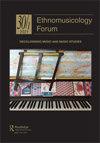一次又一次的冲突:纪念加里波利战役的音乐
IF 0.5
1区 艺术学
0 MUSIC
引用次数: 0
摘要
战争何时结束,和平何时开始?纪念活动是否不可磨灭地将冲突与冲突后区分开来?在这篇文章中,我认为纪念仪式通过在和解的幌子下隐藏报复来延长正在进行的冲突。特别提到加里波利战役一百周年纪念活动(2015年),我重点介绍了由土耳其海军赞助的标志性曲目:Çanakkale Türküsü(点燃“达达尼尔海峡民歌”)的音乐表演,该音乐表演在土耳其电视台播出,以纪念加里波利登陆一百周年。这场演出传递的信息是一种力量,一个在世界外交公海上复兴的土耳其,也是一种常态,一种每天都有战争的默认。值得注意的是,这首著名民歌的音乐编曲是社会组织的,以强调共识和包容性。此外,音乐表演强化了国外老敌人和国内新敌人之间和解的主题。这次活动安排在亚美尼亚人被驱逐一百周年纪念活动的同一天并非巧合。这样一来,和解之歌可能会变成报复之歌,将长期的冲突延伸到一个明显的后冲突时代。本文章由计算机程序翻译,如有差异,请以英文原文为准。
Conflict after conflict: music in the memorialisation of the Gallipoli Campaign
ABSTRACT When does war end and peace begin? Does commemoration serve indelibly to bracket conflict from post–conflict? In this article, I argue that memorial rituals serve to extend an ongoing conflict by concealing retribution in the guise of reconciliation. With specific reference to the centennial commemoration of the Gallipoli Campaign (2015), I focus on a musical performance of the iconic number entitled: Çanakkale Türküsü (lit. ‘The Dardanelles Folksong’) sponsored by the Turkish Navy, which was broadcast on Turkish television to mark the centennial celebration of the Gallipoli landings. The message of the performance is one of power, a resurgent Turkey on the high seas of world diplomacy – and also one of normality, a tacit recognition that war is every day. Significantly, the musical arrangement of the famous folksong is socially organised to emphasise consensus and inclusiveness. Further, the musical performance reinforces the theme of reconciliation between old enemies from abroad and new enemies at home. That the event was scheduled to coincide with the centennial commemoration of the Armenian deportations is no coincidence. In this way, a song of reconciliation might become a song of retribution by extending a longstanding conflict into an era that is apparently post conflict.
求助全文
通过发布文献求助,成功后即可免费获取论文全文。
去求助
来源期刊

Ethnomusicology Forum
MUSIC-
CiteScore
1.10
自引率
25.00%
发文量
29
期刊介绍:
Articles often emphasise first-hand, sustained engagement with people as music makers, taking the form of ethnographic writing following one or more periods of fieldwork. Typically, ethnographies aim for a broad assessment of the processes and contexts through and within which music is imagined, discussed and made. Ethnography may be synthesised with a variety of analytical, historical and other methodologies, often entering into dialogue with other disciplinary areas such as music psychology, music education, historical musicology, performance studies, critical theory, dance, folklore and linguistics. The field is therefore characterised by its breadth in theory and method, its interdisciplinary nature and its global perspective.
 求助内容:
求助内容: 应助结果提醒方式:
应助结果提醒方式:


